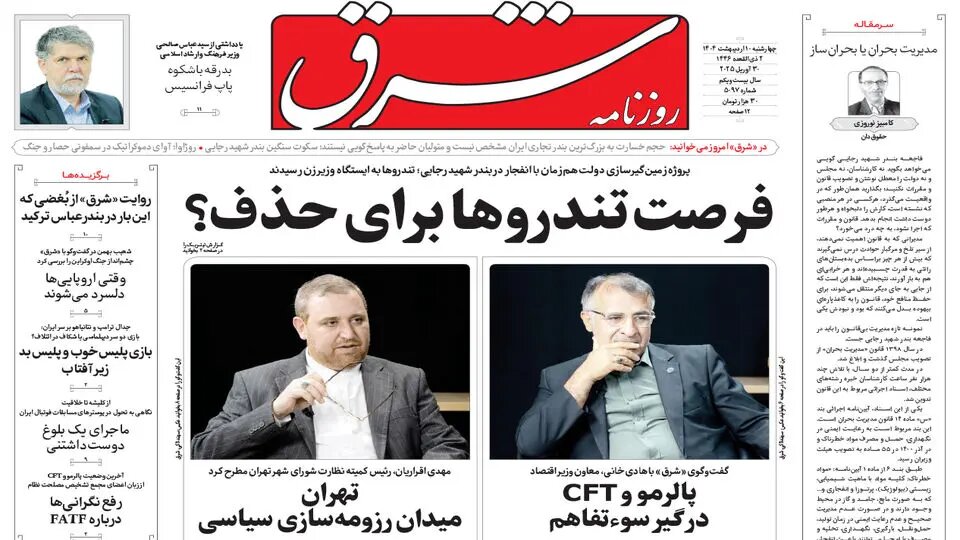Cooperation with IAEA is a step toward building trust with Europe

TEHRAN - In a note, Shargh addressed Iran’s proposal to hold a meeting with the European troika in Rome and said: The presence of the International Atomic Energy Agency’s technical team in Tehran, which was announced with Iran’s proposal for negotiations with Europe, shows Tehran’s determination to answer the Agency’s technical questions and control the tension with the European troika (France, Britain and Germany).
Inviting the Agency’s technical team could help clear up ambiguities about nuclear activities, such as undeclared materials, and prevent the issuance of a resolution against Iran at the Board of Governors. Iran’s proposal to negotiate with the European troika and cooperate with the Agency is part of a balanced strategy in nuclear diplomacy. Tehran, which is conducting indirect negotiations with the United States in Oman, is simultaneously seeking to reduce tensions with Europe and strengthen cooperation with the Agency to prevent the escalation of international pressure. This multilateral approach, although complex, demonstrates Iran’s understanding of the time and political limitations ahead. Negotiations with the U.S., held recently in Muscat with Oman’s mediation, have shown some progress, but still face obstacles such as disagreements over long-term guarantees.
Jam-e-Jam: Affecting the Caucasus developments through constructive interaction with Baku
Jam-e-Jam analyzed President Pezeshkian’s one-day visit to the Republic of Azerbaijan and wrote: This visit should be considered more than a typical diplomatic event. This visit can be considered a clear message from Tehran to reconsider its regional policies, especially towards the South Caucasus region. In recent years, the Caucasus has become one of the most important centers of geopolitical developments in the world, a region where the competition between great powers, from Russia and Turkey to Europe and the United States, can be clearly seen in the changing new world order. Expanding Tehran-Baku relations in various fields will allow Iran to influence Baku's regional policies, diminish the role of third parties, and further reduce security and political challenges in the region. Also, strengthening and improving relations with the Republic of Azerbaijan will provide Tehran with an opportunity to act as a mediator in the conflicts between Armenia and the Republic of Azerbaijan. This, in turn, can prevent the presence of extra-regional countries in the South Caucasus and ensure the interests and national security of the Islamic Republic of Iran.
Ettelaat: Israel is major obstacle to Iran-US agreement
Ettelaat spoke with Ahmad Naghibzadeh, a political science professor, about the progress in Iran-U.S. negotiations. He said: Apparently, our negotiations with the Americans are proceeding slowly and there have been many analyses about the positivity of the talks between the two sides. It must be admitted that both Iran and the U.S. have red lines that they don’t compromise under any circumstances. Therefore, the idea of understanding and reaching a common ground seems far-fetched. Despite the efforts made by both sides and even Donald Trump commenting on the negotiations, the weapons that the U.S. has brought to the region are not for nothing. We also cannot be indifferent to Israel's moves against an agreement. In any case, any cooperation between Tehran and Washington is 100% in conflict with what is important to Israel, and for this reason, they are the main obstacle to realizing an agreement. Given the depth of the differences between Iran and the U.S., it should be said that the start of talks between the parties can be a sign of the serious will of both sides to end or reduce the differences, but reaching an agreement is very difficult.
Sobh-e-No: Aliyev should learn from Zelensky’s fate
The unfortunate truth is that in recent years, instead of focusing on regional relations, Baku has become a backyard of Washington and Tel Aviv. Even spy agencies affiliated with the U.S. and the Zionist regime have started planning security conspiracies in this context. In fact, Aliyev preferred that the security of the Republic of Azerbaijan be ensured under the political, military, and security plan of the U.S. and Israel, but now is the time to take a different approach after observing the fate of Zelensky. Baku, in the vicinity of an independent and strong neighbor like Tehran and with the goodwill of the Islamic Republic, can make the best use of the opportunities and capacities available by welcoming the strengthening of bilateral interactions. On this basis, Aliyev can choose the desired path for Baku's future at a fateful crossroads: political independence and improving relations with neighbors, or continuing to move along the goals of the U.S. and the Zionist regime.
Leave a Comment